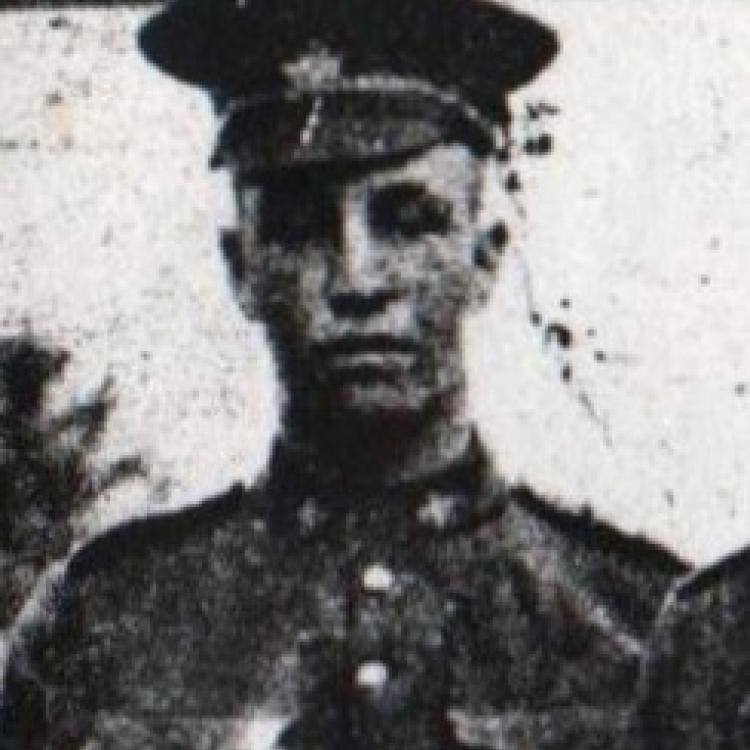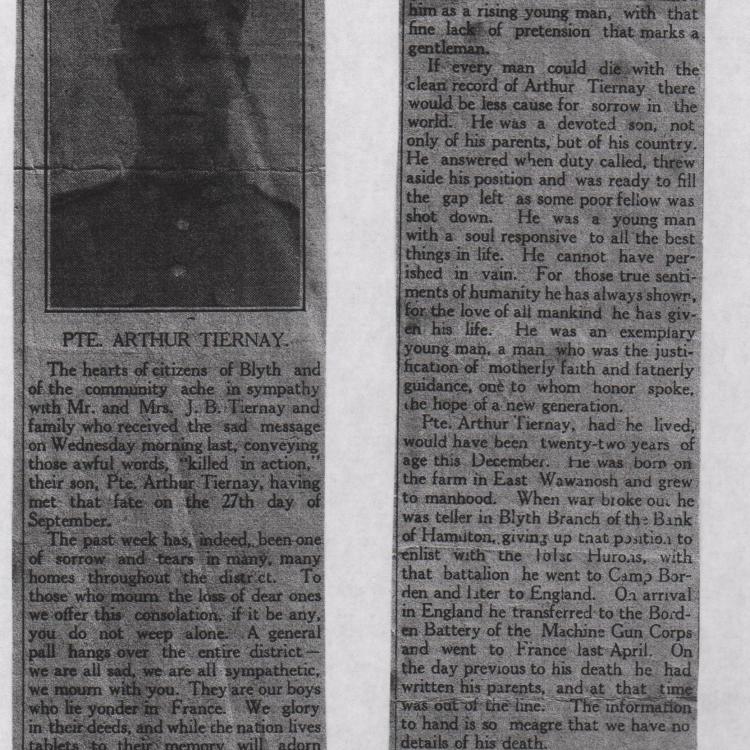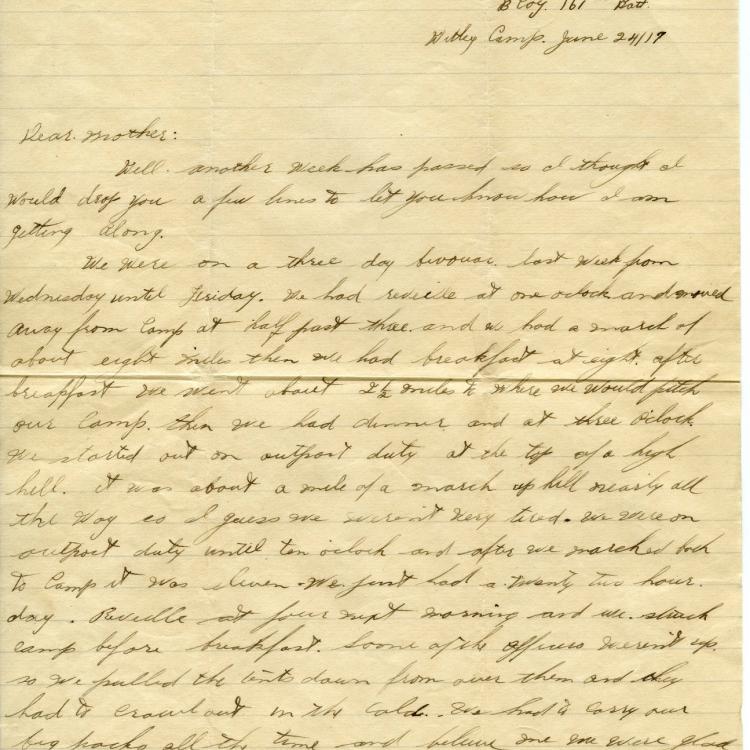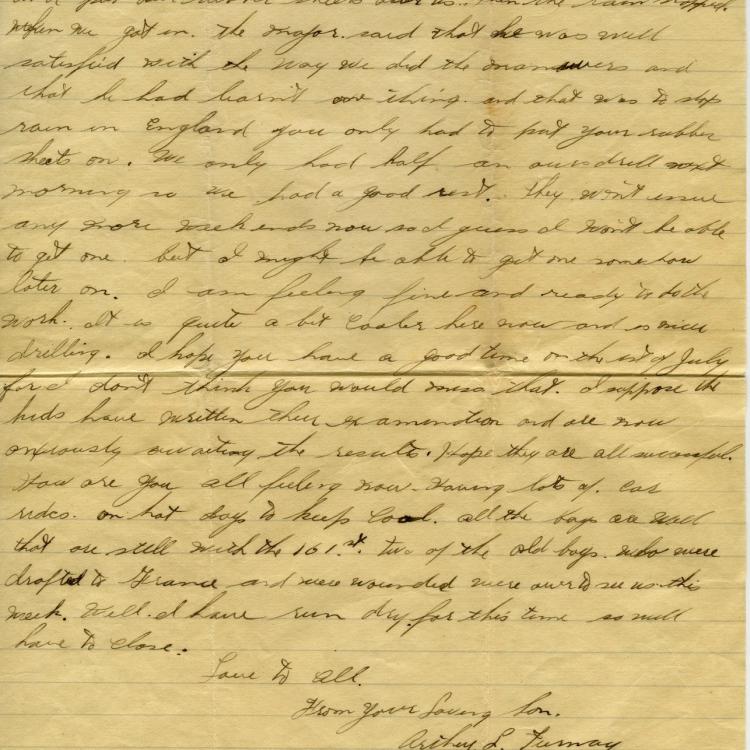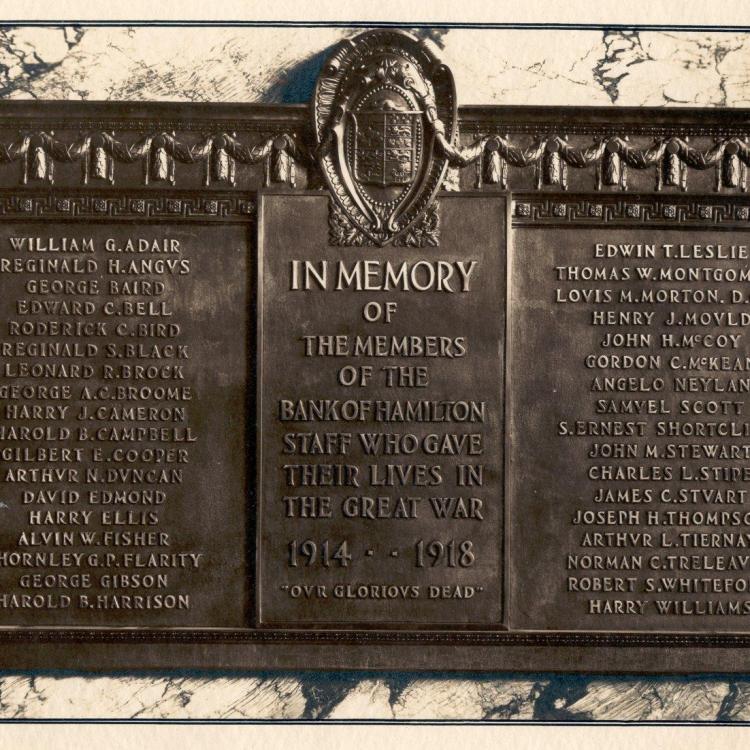TIERNAY, Arthur Leopold
Next of Kin: James B. and Cecilia E. Tiernay, Blyth, Ontario
Occupation: Banker
Personal Details: 6 ft. 1 in., 184 lbs., ruddy complexion, brown eyes, fair hair, Church of England
Arthur Leopold Tiernay (Tierney) was born on his family’s farm, located one mile west of Blyth, in East Wawanosh Township. One of seven children, Arthur received his education at USS No. 11 Hullett and East Wawanosh where he regularly achieved honours standing. This is evidenced through an August 4, 1910, report in The Brussels Post which read, “THE WINNER.-Last Spring THE STANDARD offered a volume entitled “The Canadian Farmer’s Manual of Agriculture,” to the boy attending a rural school who took the best marks at the Entrance Examination held at Blyth. The winner was Arthur Tierney whom we congratulate on his success and hope he may win many a victory as he pursues his course both in and out of school.” In July of 1915 he accepted a junior position with the Blyth branch of the Bank of Hamilton.
Answering the call for recruits, Arthur left his bank teller’s job and enlisted with the 161st Huron Battalion in early 1916. According to a report in The Wingham Advance, high grade silver wrist watches were presented to 36 Blyth area soldiers, including Arthur Tierney, at an April 1916 concert put on by the Blyth War Auxiliary in the Industry Hall.
While in basic training Arthur was appointed Lance Corporal, a rank that was confirmed on November 22, 1916 after the battalion’s arrival at Dibgate Camp, near Shorncliffe, England. At his request, Arthur reverted to the rank of Private on August 29, 1917 while training at Witley Camp. In early March 1918 he was transferred to the 4th Reserve Battalion at Bramshott Camp, and subsequently to the 47th Battalion, who sailed for France on March 28th. After spending a couple of weeks at the Canadian Corps Reinforcement Camp, Arthur was transferred to the Canadian Machine Gun Corps. On June 7, 1918 he was transferred again to the 1st Canadian Motor Machine Gun Brigade.
On September 26, 1918, the day before Private Tiernay’s death, the 1st Motor Machine Gun Brigade was located at Tilloy-les-Hermaville, France, preparing to take part in a major action that would become known as the Battle of the Canal du Nord. In the late afternoon A, B, C and E Batteries moved to take up their barrage positions north of Inchy. At 7:00 p.m. the trench mortars and armoured cars left camp and proceeded to positions along the Neuville Vitasse – Wancourt Road. Zero hour was set for 5:20 a.m. on September 27th. The Batteries successfully carried out their firing program, but reported 7 killed and 12 wounded. At 11:00 a.m. the entire Brigade then concentrated with their vehicles south of Buissy. At 2:45 p.m. the whole Brigade crossed the dry bed of the Canal du Nord and concentrated east of Sains-les-Marquion where they remained for the night. Losses reported after they crossed the canal were 1 killed and 2 wounded. The specific details of Private Tiernay’s death are unknown, and the war diaries of the 1st Canadian Motor Machine Gun Brigade do not indicate if he fell in battle during the morning or afternoon advance.
Arthur was one of thirty-five Bank of Hamilton employees who had enlisted to serve their county and who died in the line of duty. The names are inscribed on a bronze plaque displayed at the former Bank of Montreal building in Hamilton.
Excerpts from a newspaper article in The Blyth Standard of October 24, 1918 reveal how beloved Arthur was in his community, “Pte. Arthur Tiernay was one whom we all esteemed. His was a character for all to love. He radiated with golden goodwill to all. He was a clean, high-minded young Canadian and he gave his life in the cause of pure democracy as freely as he gave his nature to those who knew him as a rising young man, with that fine lack of pretension that marks a gentleman. If every man could die with the clean record of Arthur Tiernay there would be less cause for sorrow in the world. He was a devoted son, not only of his parents, but of his country. He answered when duty called, threw aside his position and was ready to fill the gap left as some poor fellow was shot down. He was a young man with a soul responsive to all the best things in life. He was an exemplary young man who was the justification of motherly faith and fatherly guidance, one to whom honour spoke, the hope of a new generation.”

